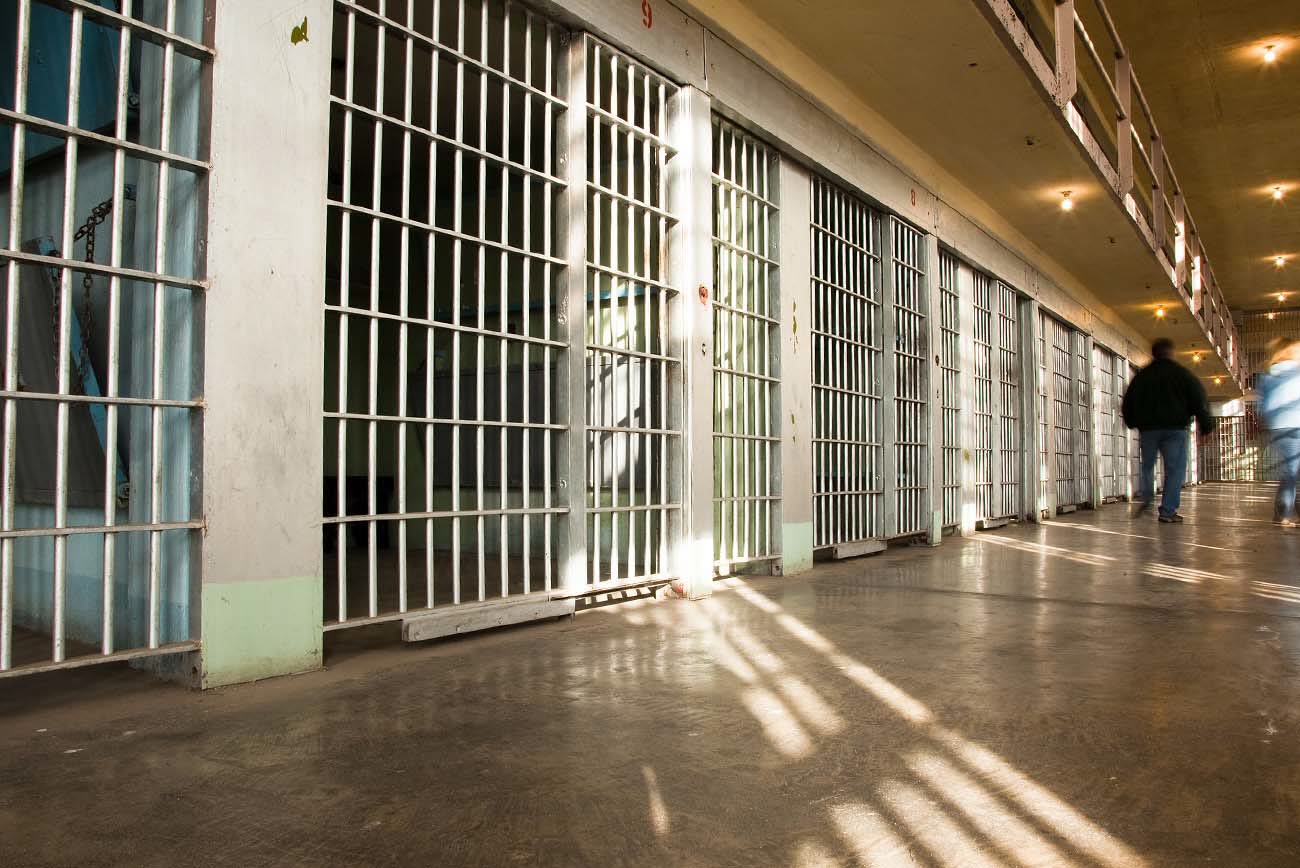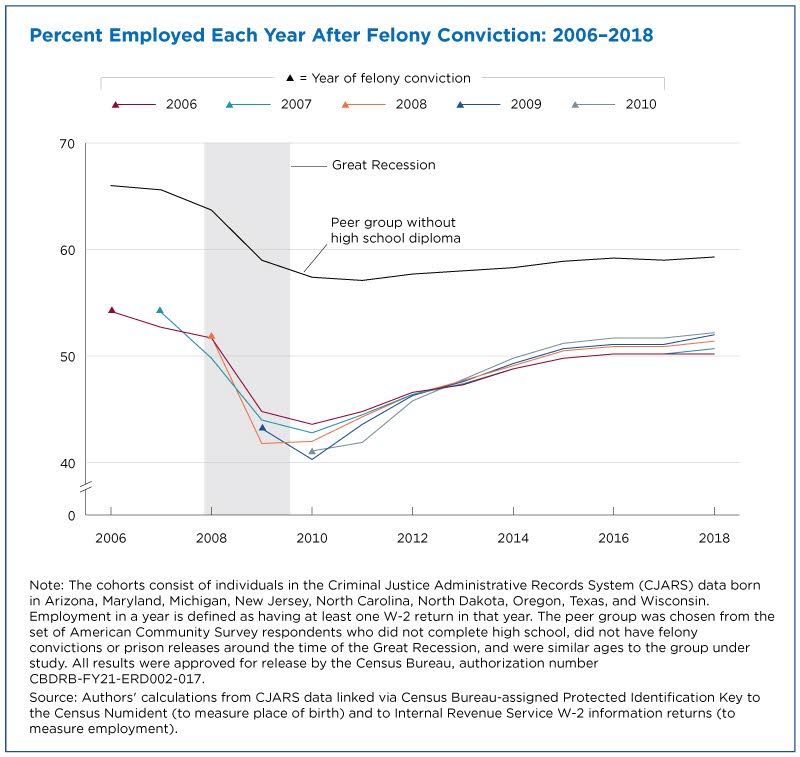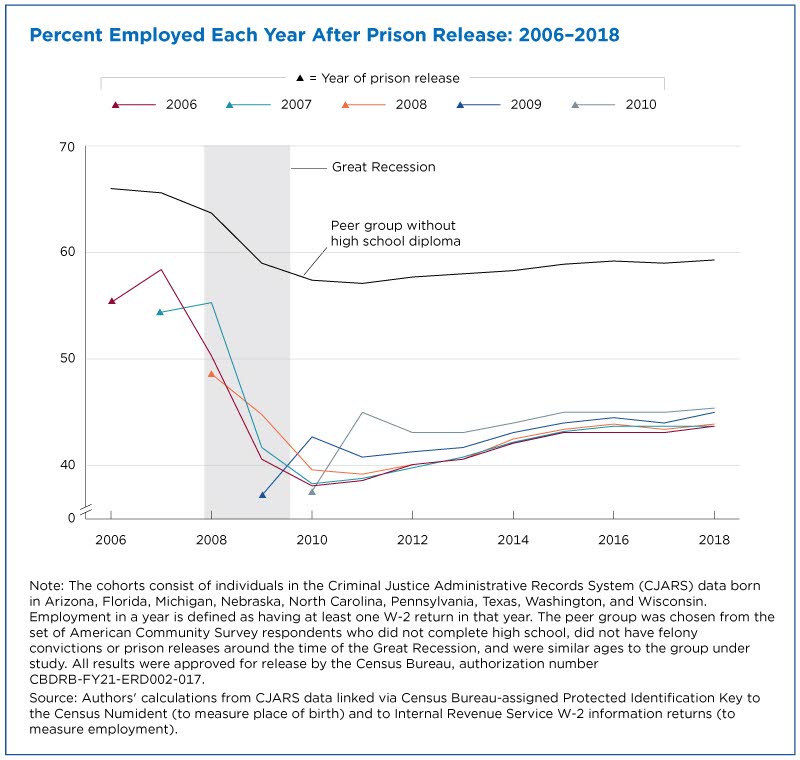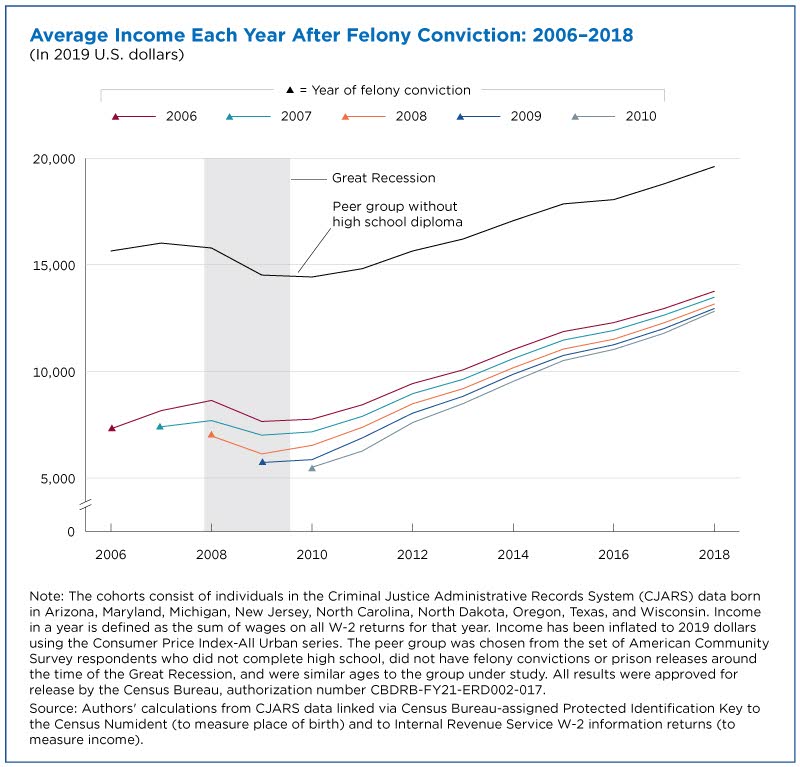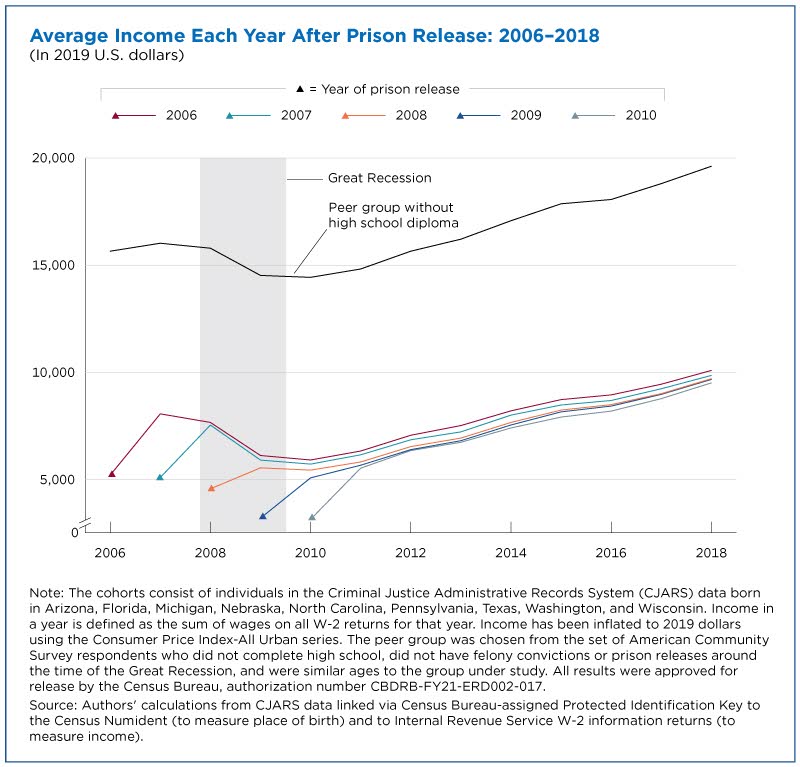Great Recession Had Long-Term Economic Impact on People With Felony Convictions, Prison Time
For people who have served time in prison or have a felony conviction, finding a job and source of income is a crucial part of successfully reintegrating into society.
U.S. Census Bureau and University of Michigan researchers measured the employment and income of people who were convicted of a felony or released from prison around the time of the Great Recession (December 2007–June 2009) in a recent publication.
The findings: Employment and income of people convicted of a felony or released from prison during the Great Recession were substantially lower than that of their peers who did not complete high school and did not have similar criminal histories.
Felony conviction and prison release were identified from the Criminal Justice Administrative Records System (CJARS), an innovative data project designed to measure the scope and performance of the U.S. criminal justice system and characteristics of the population that interacts with it.
Researchers used tax data from the Internal Revenue Service to calculate the percentage of people who worked for at least one employer in a year (employment) and the average income from all employers in a year (income). All incomes were adjusted for inflation.
Employment and Income Is Low Relative to Peers
To understand how individuals’ criminal histories affected their employment and income, the researchers compared their outcomes to those of a peer group of people who did not have a high school degree and had no record of a felony conviction or prison release around the time of the Great Recession.
This group was a good comparison because its educational completion was also associated with low employment and income. These individuals were identified from 2005-2016 American Community Survey responses and their employment and income were also measured from tax data.
The findings: Employment and income of people convicted of a felony or released from prison during the Great Recession were substantially lower than that of their peers who did not complete high school and did not have similar criminal histories.
According to the research, people with a felony conviction were about 10 percentage points less likely than peers without similar criminal histories to be employed; people released from prison were 17 percentage points less likely than peers to be employed.
About 53% of people convicted of a felony in 2006 were employed in 2007, before the recession started, and about 50% were employed in 2018, well into the post-recession recovery. About 58% of those released from prison in 2006 were employed in 2007 and about 44% in 2018.
In comparison, about 66% of their peers without a felony conviction or prison release were employed in 2007 and about 59% in 2018.
The differences are also clear in income levels: Average annual income from 2006 to 2018 was about $7,000 lower for those with a felony conviction and about $10,000 lower for those released from prison.
Those who had been convicted of a felony in 2006 had average annual income of $8,160 in 2007 and $13,760 in 2018. People released from prison in 2006 had average annual income of $8,065 in 2007 and $10,090 in 2018.
The average income of peers without felony convictions or prison releases was $16,020 in 2007 and $19,610 in 2018.
Long-Term Impact of Great Recession
The Great Recession disrupted the reintegration experiences of those convicted of a felony or released from prison right before the recession started. It also led to long-term employment and income declines.
Employment growth was stronger for people convicted of a felony or released from prison right after the recession ended.
People convicted of a felony or released from prison experienced slow, steady increases in average annual income during the economic recovery, but not enough to catch up to the outcomes of the peer group in this research.
For people released from prison in particular, income increased at a slower pace, widening the gap between their income and the income of peers over time.
People released from prison often experience a temporary bump up in employment and income in the year after release. These employment bumps could be related to conditional release requirements imposed on people in parole programs.
While this research does not examine these programs directly, these data show that the Great Recession wiped out the first-year bump after prison release, likely because of fewer job opportunities overall.
About the Criminal Justice Data
Census Bureau surveys do not usually ask respondents about involvement in the criminal justice system. And federal statistical surveys about criminal justice involvement do not typically collect long-term measures of employment or income.
The kind of research discussed here is only possible with administrative data, which are data collected by organizations for an operational purpose and not for a statistical purpose. Both the criminal justice and tax data used here are administrative data.
CJARS is a joint project of the Census Bureau and the University of Michigan. It is a nationally integrated data infrastructure project designed to transform research and policy making on the U.S. criminal justice system.
At the University of Michigan, CJARS collects longitudinal electronic records from criminal justice agencies and harmonizes these records to track criminal episodes across all stages of the criminal justice system.
On approved Census Bureau projects, criminal justice records can be linked anonymously, down to the individual, with extensive social, demographic and economic data from surveys and administrative records.
Agencies interested in participating in this project can contact the CJARS team.
In this research, felony conviction was identified using state court data from Arizona, Maryland, Michigan, New Jersey, North Carolina, North Dakota, Oregon, Texas, and Wisconsin.
Prison release was identified using state departments of correction data from Arizona, Florida, Michigan, Nebraska, North Carolina, Pennsylvania, Texas, Washington, and Wisconsin.
CJARS continues to grow as new jurisdictions participate.
Subscribe
Our email newsletter is sent out on the day we publish a story. Get an alert directly in your inbox to read, share and blog about our newest stories.
Contact our Public Information Office for media inquiries or interviews.
-
America Counts StoryWill Post-COVID Unemployment Insurance Be Like After Great Recession?November 03, 2021The share of adults who received UI reached a six-year low in 2018 during the Great Recession recovery. So far during the pandemic, UI receipt remains high.
-
America Counts StoryWhy Did Labor Force Participation Rate Dip When the Economy Was Good?June 21, 2021The U.S. Census Bureau’s 2010-2019 American Community Survey sheds light on the impact of aging baby boomers on the labor force and employment characteristics.
-
America Counts StoryA New Way to Measure How Many Americans Work More Than One JobFebruary 03, 2021The number of workers holding two or more jobs has increased from 1996 to 2018. The Census Bureau’s Longitudinal Employer-Household Dynamics tracks the growth.
-
EmploymentThe Stories Behind Census Numbers in 2025December 22, 2025A year-end review of America Counts stories on everything from families and housing to business and income.
-
Families and Living ArrangementsMore First-Time Moms Live With an Unmarried PartnerDecember 16, 2025About a quarter of all first-time mothers were cohabiting at the time of childbirth in the early 2020s. College-educated moms were more likely to be married.
-
Business and EconomyState Governments Parlay Sports Betting Into Tax WindfallDecember 10, 2025Total state-level sports betting tax revenues has increased 382% since the third quarter of 2021, when data collection began.
-
EmploymentU.S. Workforce is Aging, Especially in Some FirmsDecember 02, 2025Firms in sectors like utilities and manufacturing and states like Maine are more likely to have a high share of workers over age 55.
